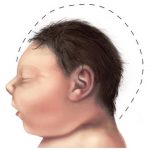 Head circumference is not an accurate indicator of viral infection in newborns, researchers report.
Head circumference is not an accurate indicator of viral infection in newborns, researchers report.
Zika virus has been linked to microcephaly in the babies of infected mothers, leading some organizations, including the Brazilian ministry of health, to focus on newborns’ head circumferences as an infection indicator. But this approach only identifies a fraction of Zika cases in newborns, researchers reported yesterday (June 29) in The Lancet, suggesting that measurements of head circumference should be combined with other criteria to provide a more accurate diagnosis.
“One in five definite or probable Zika cases had head circumference values in the normal range,” study coauthor Cesar Victora of the Federal University of Pelotas in Brazil said in a statement. “Therefore, the current focus on microcephaly screening alone is too narrow.”
In their review of 1,501 suspected cases of microcephaly investigated in Brazil between November 2015 and February 2016, the researchers also found that rashes—a potential indicator of infection—reported in mothers late in pregnancy were associated with brain abnormalities in newborns even if the babies’ head circumferences were in the normal range. “We should not equate Zika congenital infection with microcephaly,” Victora told CBC News. “We could well have many babies with normal head size who are affected. We will need to think about other exams to screen these babies, such as improving the diagnostic test we have for Zika and also possibly in areas that are undergoing an epidemic, doing ultrasound of the brains of these babies as soon as they are born.”
In another study published today in the same journal, a team led by researchers from the US Centers for Disease Control and Prevention (CDC) reported detecting Zika virus antigens in the neurons and glial cells of three deceased infants, adding support to the theory that the virus causes birth abnormalities by attacking the nervous system and impairing brain and muscle development.
“Until now, there have been no reports of a mosquito-borne virus that could cause severe birth defects,” study coauthor Sherif Zaki said in a statement. “We are continuing to investigate the possible spectrum of neurological defects in infants and various abnormalities in placental tissues, and further studies will now need to look at whether there is a link between birth defects and Zika virus infection during the second and third trimester of pregnancy, and understand the mechanism of transmission.”
Source: The Scientist

















